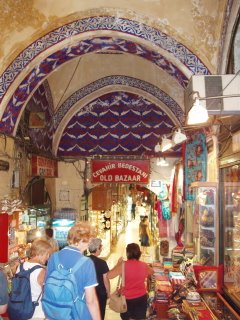 Miriam got a huge pile of presents for her birthday on Saturday. She really likes them, and is sharing them with Alice. One great gift was a snap-circuits toy from Aunt Elaine. As soon as she saw it, Miriam -- who had played with snap-circuits at school -- said she wanted to make a flying saucer. This involves wiring up a twirling device that launches a wheel into the air. The 2-story front hall is a perfect location for launching this. She has also made a sound detector and an OR-logic gate with a lightbulb, following the directions with a little help and explanation. We also played one game of Mousetrap: a very nice gift.
Miriam got a huge pile of presents for her birthday on Saturday. She really likes them, and is sharing them with Alice. One great gift was a snap-circuits toy from Aunt Elaine. As soon as she saw it, Miriam -- who had played with snap-circuits at school -- said she wanted to make a flying saucer. This involves wiring up a twirling device that launches a wheel into the air. The 2-story front hall is a perfect location for launching this. She has also made a sound detector and an OR-logic gate with a lightbulb, following the directions with a little help and explanation. We also played one game of Mousetrap: a very nice gift.Both girls were very enthusiastic about a makeup kit Miriam received; Tracy helped them put on makeup and nail polish. They have been hoping for makeup for a while, especially because of a couple of false alarms when a "makeup session" for ballet classes turned out NOT to be a fashion expert, but just a re-scheduled class. Here is Alice wearing makeup and Miriam drying her nails:



 Last night and this morning, Miriam and Alice were playing with two Bratz dolls: Yasmin, a gymnast, and Chloe, a soccer player. As documented in Consumer Reports, removing the dolls from the fetters and shackles of cardboard, plastic, nylon rope, and metal twisters was challenging and time-consuming, but I succeeded without snipping off any hair, clothing, or limbs.
Last night and this morning, Miriam and Alice were playing with two Bratz dolls: Yasmin, a gymnast, and Chloe, a soccer player. As documented in Consumer Reports, removing the dolls from the fetters and shackles of cardboard, plastic, nylon rope, and metal twisters was challenging and time-consuming, but I succeeded without snipping off any hair, clothing, or limbs.Chloe kicks the soccer ball and gets a trophy. Yasmin does tricks on the balance beam and also gets a trophy. She owns a gym bag and a water bottle. I'm really impressed by these dolls, as they at least channel imaginative play into action, rather than just dressing the dolls and brushing their hair. Each doll in fact does own a color- coordinated hairbrush, but it is only a minor part of the game.
Like most adults, I find it unnerving that the Bratz girls' shoes are removable, but they come off with a peg into the leg which also removes their feet. Yasmin's feet are bare but they come off anyway. Unfortunately, Chloe's shoes are too big to fit into the foot-holder of the balance beam, so she can only play soccer, not join in the gymnastics contest. Alice traded their feet briefly so that Chloe could try the balance beam, but this didn't seem to appeal to them.













